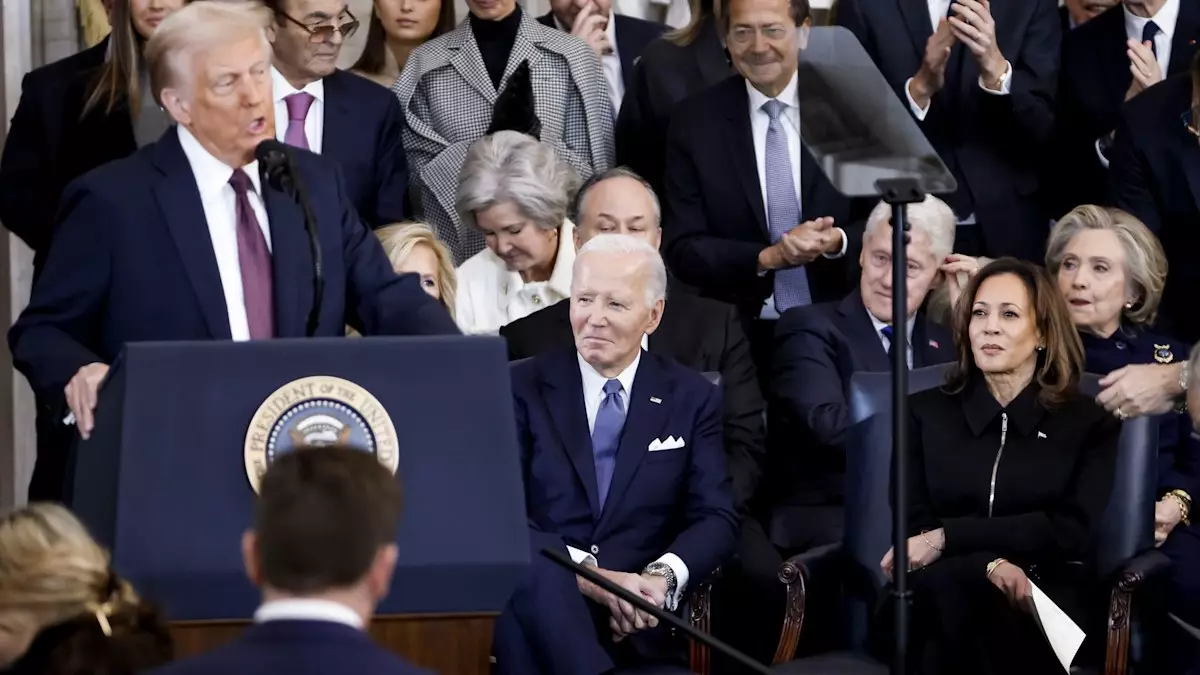The inauguration of a president is a moment laden with both hope and apprehension, a time when political ideologies clash publicly as a new leader takes the helm. Donald Trump’s inaugural speech is no exception, encapsulating a mixture of bravado and fiery rhetoric that underscores the polarized state of American politics. In this article, we will dissect the themes and implications of Trump’s address, considering its impact on the nation and the political landscape ahead.
From the onset of his address, Trump’s comments were aimed squarely at his political opponents, particularly Joe Biden. In stark terms, he criticized Biden’s ability to handle domestic crises, stating, “he can’t even manage a simple crisis at home.” This jab reveals a deeply entrenched animosity that exists between the two leaders and sets a combative tone for Trump’s presidency, suggesting that his administration would prioritize confrontation over collaboration.
Moreover, the palpable tension was evident as Biden and Kamala Harris refrained from applauding during critical moments of Trump’s speech. This lack of engagement highlighted the stark divide that permeates contemporary American politics, where partisan divisions have rendered bipartisan appreciation a rarity. The nuances of this dynamic will undoubtedly shape legislative agendas and public discourse in the days ahead.
Central to Trump’s speech was the rallying cry to “Make America Great Again.” This sentiment was reiterated in various ways throughout his address, emphasizing a radical reversal of what he termed a “horrible betrayal” by previous administrations. Trump’s belief in a mandate from the people to restore faith, wealth, democracy, and freedom resonated with his supporters, calling for a sweeping reclamation of American values.
His assertion that “the decline of America is over” encapsulates a vengeful promise to restore the nation’s honor and integrity. It raises questions about the reality of past leadership and societal direction under previous administrations, clearly casting himself as the agent of change who alone can salvage America’s fate. This binary perspective of politics—good versus evil, right versus wrong—can invigorate his base but may also alienate those who view governance as a collaborative effort.
One particularly striking aspect of Trump’s address was his assertion of divine intervention following an assassination attempt. By stating that his survival was for a purpose, he framed his presidency not merely as a political endeavor but as a moral crusade, reinforced by a belief in God’s will. This rhetoric aims to galvanize support from religious constituents, intertwining faith with his political narrative—a move that could consolidate a devoted following but may simultaneously alienate secular perspectives.
In mentioning his personal challenges and survival, Trump positioned himself as a martyr of sorts—a leader who has endured trials that legitimize his authority and passion. Such rhetoric serves not just to inspire but also to invoke sympathy, drawing poignant lines between the personal and the political.
Toward the close of his speech, Trump painted an optimistic portrait of the future: a “golden age” characterized by prosperity and national pride. His promise that America would regain its stature on the global stage resonates with many who crave a return to what they perceive as the nation’s former glory. This vision, however, raises practical considerations regarding feasibility and the potential for backlash if such promises are not realized.
Additionally, Trump outlined policy initiatives such as heightened immigration laws and scrutiny over the Panama Canal. These proposals reflect a nativist approach that can appeal to a certain portion of voters while simultaneously inciting concern among others regarding America’s role in an interconnected world.
In the aftermath of Trump’s inaugural address, the unfinished work of uniting a deeply fractured nation looms large. While his speech stirs fervor among supporters, it runs the risk of deepening divides as starkly contrasting approaches to governance emerge. The next steps taken by his administration will be crucial not only in determining the political landscape but also in defining America’s identity moving forward.
Trump’s inaugural address was a reflection of the nation’s complexities—infused with brash declarations, personal anecdotes, religious allusions, and lofty promises. As citizens digest these messages, the conversation around leadership, crisis management, and national direction continues, underscoring that the path toward healing and unity is fraught with challenges ahead.

